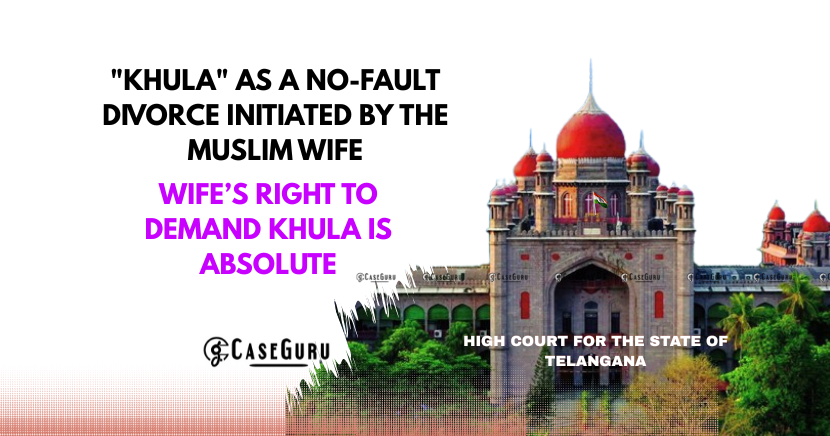
Telangana High Court Emphasizes "Khula" As A No-Fault Divorce Initiated By The Muslim Wife.
The Division Bench of Telangana High Court clarifies on 'Khula' divorce in Muslim Personal Law and limited options for husband to refuse it; emphasizing the wife's absolute right to initiate Khula. The Court providing crucial insights for Khula divorce proceedings under Muslim personal law in India.
A significan Judgment is pronouned on, June 24, 2025 by the Division Bench of High Court For The State of Telangana on the Khula (Divorce) rights of Muslim wife under Muslim personal law (family law), the Judgment was pronounced by Justice Moushumi Bhattacharya and Justice B.R. Madhusudhan Rao. The Division Bench, while hearing the Family Court Appeal (FCA.NO.75 OF 2024) filed by a husband which is stemmed from an order of the Family Court, Hyderabad, dated February 6, 2024, which had dismissed the husband's petition seeking a declaration that the Khulanama (divorce certificate) issued by a private body, Sada-E-Haq Sharai Council (Respondent No.2), was null and void, and also challenging the Family Court's decision to not nullify a 'Khula' divorce obtained by his wife.
The appellant husband and respondent wife got married in 2012 and developed domestic discord, and wife alleging domestic voilance. The respondent/wife sought a 'Khula' divorce, which the husband refused. Consequently, the wife approached Sada-E-Haq Sharai Council (respondent no.2) an organization comprising experts in Muslim Law, which attempted to reconciliate between the couple, and after failed reconciliation attempts due to the husband's questioning of its authority and refusal to attend meetings, the organization issued a Khulanama in October 2020, which became the primary reason for the husband challenge before the Family Court. The husband/appellant asserted that the private council lacked the jurisdiction and authority to dissolve the marriage or issue such a certificate. The Family Court, however, dismissed his petition, concluding that the wife had obtained 'Khula' by following established procedure and that the council had acted correctly in issuing the certificate.
A pivotal observation made by the Devision Bench of High Court is whether the wife is liable to get Khula divorce from her husband without him accepting the offer of Khula?
In its judgment, the High Court provided a comprehensive clarification of 'Khula' divorce, defining it as a mode of dissolution initiated by the muslim wife when she no longer wishes to continue the marital life with her husband, and it generally does not require the husband's consent. The Court further emphasized that a wife's right to Khula is absolute and parallel to a husband's right to Talaq. While reconciliation efforts are an important precondition for a valid Khula, the husband's refusal to grant Khula only allows him to negotiate the return of dower, not to refuse the divorce itself.
Althought the Court reiterated the Advisory Nature of "Opinion or Fatwa" given by a Mufti or a private religious bodies and that it not legally enforceable or binding in a court of law. Nevertheless, upheld the Family Courts decision to revoke such Khula Divorce observing that the Khula was taken after following the established procedure prescirbed in law and that the organization/council has acted correctly in issuing the certificate of Khula Divorce.
The Court held that "39. Since the wife’s right to demand Khula is absolute and does not have to be predicated on a cause or acceptance of the demand by the husband, the only role of a Court of law is to put a judicial stamp on the termination of the marriage, which then becomes binding on both parties."
However, the Court also observed that if the husband is agrieved by such a Khula then he may approach the Family Court by following the due process as the Family Court serves as the sole forum for adjudicating the marital status and providing a judicial stamp on the termination of the marriage, making it binding on both parties.
The High Court agreed with the Family Court's dismissal of the husband's petition, finding his prayer to declare the Khulanama null and void to be "unnecessary and superfluous," since the Family Court's own decision on the marital status was binding. Ultimately, the appeal made by the husband was dismissed, affirming that the marriage was no longer subsites.
Coram: Justice Moushumi Bhattacharya And Justice B.R.Madhusudhan Rao



Comments